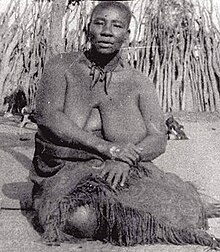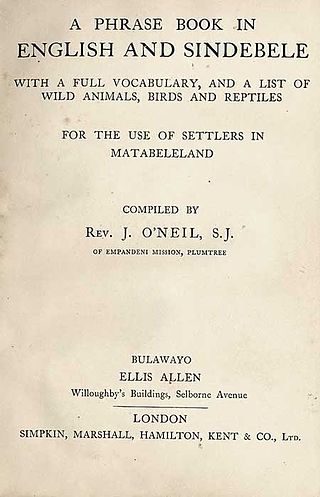Lozikeyi Dlodlo (died 1919) was a queen regent [1] of the Ndebele people in Southern Africa.
Contents
| Lozikeyi Dlodlo | |
|---|---|
| Queen of Ndebele | |
 | |
| Died | 1919 |
Lozikeyi Dlodlo (died 1919) was a queen regent [1] of the Ndebele people in Southern Africa.
| Lozikeyi Dlodlo | |
|---|---|
| Queen of Ndebele | |
 | |
| Died | 1919 |
Lozikeyi was one of the favourite wives of Lobengula, [2] and a senior queen, until 1893. She had no sons, only daughters, yet even so was influential in the attempt to have the son of a co-wife serve as her husband's successor. She was known for her outspokenness [3] and for her defiance of the white settlers in what would later become Rhodesia. [4] When her husband disappeared, she served for a time as de facto regent of the kingdom. [5] Her place of retirement in the Bembezi River was an island which came to be known as the "Queen's Location". [3] Lozikeyi died at Nkosikazi in Bubi District of influenza; [5] her grave in the vicinity may still be visited, although its condition has been described as "neglected". [6] Nearby is a school for which she lobbied and which she opened; it still serves students, although it has not been modernized. [4] She was the subject of a biography, Lozikeyi Dlodlo Queen of the Ndebele: "A Very Dangerous and Intriguing Woman" by Marieke Faber Clarke and Pathisa Nyathi, published in 2013. [7] Four photographs of her are in the collection of the Bodleian Library in Oxford, [8] which featured her in an exhibit during the construction of a new wing. [9]
Queen Lozikeyi took over leadership of the Ndebele nation due to the constitutional precedent among the Nguni people. [10] Queen Lozikeyi was not the first woman to lead in this capacity. But rather was a part of a collection of strong influential royal woman in Nguni society. Queen Labotsibeni Mdluli was queen mother of Swaziland from 1889 to her death in 1925.
Lozikeyi Dlodlo played an important role in the Anglo-Matabele war of 1896. She was in charge of the King's army. Together with her twin brother, Muntuwani, she ensured that the army had enough ammunition ahead of the 1896 war by using the weaponry her husband did not use in the first Anglo-Matabele war of 1893. [10]
Nandi KaBhebhe was a daughter of Bhebhe, a past Elangeni chief and the mother of Shaka kaSenzangakhona, King of the Zulus.

Bulawayo is the second largest city in Zimbabwe, and the largest city in the country's Matabeleland region. The city's population is disputed; the 2022 census listed it at 665,940, while the Bulawayo City Council claimed it to be about 1.2 million. Bulawayo covers an area of about 546 square kilometres in the western part of the country, along the Matsheumhlope River. Along with the capital Harare, Bulawayo is one of two cities in Zimbabwe that is also a province.

Matabeleland is a region located in southwestern Zimbabwe that is divided into three provinces: Matabeleland North, Bulawayo, and Matabeleland South. These provinces are in the west and south-west of Zimbabwe, between the Limpopo and Zambezi rivers and are further separated from Midlands by the Shangani River in central Zimbabwe. The region is named after its inhabitants, the Ndebele people who were called "Amatabele"(people with long spears – Mzilikazi 's group of people who were escaping the Mfecani wars). Other ethnic groups who inhabit parts of Matabeleland include the Tonga, Bakalanga, Venda, Nambya, Khoisan, Xhosa, Sotho, Tswana, and Tsonga. The population of Matabeleland is just over 20% of the Zimbabwe's total.

MzilikaziMoselekatse, Khumalo was a Southern African king who founded the Ndebele Kingdom now called Matebeleland which is now part of Zimbabwe. His name means "the great river of blood". He was born the son of Mashobane kaMangethe near Mkuze, Zululand, and died at Ingama, Matabeleland. Many consider him to be the greatest Southern African military leader after the Zulu king, Shaka. In his autobiography, David Livingstone referred to Mzilikazi as the second most impressive leader he encountered on the African continent.

Northern Ndebele, also called Ndebele, isiNdebele saseNyakatho, Zimbabwean Ndebele or North Ndebele, associated with the term Matabele, is a Bantu language spoken by the Northern Ndebele people which belongs to the Nguni group of languages.
The Northern Ndebele people are a Nguni ethnic group native to Southern Africa. Significant populations of native speakers of the Northen Ndebele language (siNdebele) are found in Zimbabwe.
Inyathi is a village located in the Bubi District of Matabeleland North, Zimbabwe that grew from colonization by missionaries in the late 19th century. The Mission itself sits upon around 2,729 hectares of land. Inyathi is about 100 kilometres (62 mi) from Bulawayo and has a number of gold mines that have inspired both corporate and illegal mining.

Ndebele house painting is a style of African art practiced by the Southern Ndebele people of South Africa and the Northern Ndebele people in Zimbabwe in Matobo. It is predominantly practiced by the Ndebele women.
Enos Mzombi Nkala was one of the founders of the Zimbabwe African National Union.

The First Matabele War was fought between 1893 and 1894 in modern-day Zimbabwe. It pitted the British South Africa Company against the Ndebele (Matabele) Kingdom. Lobengula, king of the Ndebele, had tried to avoid outright war with the company's pioneers because he and his advisors were mindful of the destructive power of European-produced weapons on traditional Matabele impis attacking in massed ranks. Lobengula reportedly could muster 80,000 spearmen and 20,000 riflemen, armed with Martini-Henry rifles, which were modern arms at that time. However, poor training meant that these were not used effectively.

The Second Matabele War, also known as the Matabeleland Rebellion or part of what is now known in Zimbabwe as the First Chimurenga, was fought between 1896 and 1897 in the region later known as Southern Rhodesia, now modern-day Zimbabwe. It pitted the British South Africa Company against the Matabele people, which led to conflict with the Shona people in the rest of Southern Rhodesia.

The Nguni people are a cultural group in southern Africa made up of Bantu ethnic groups from South Africa, with offshoots in neighboring countries in Southern Africa. Swazi people live in both South Africa and Eswatini, while Northern Ndebele people live in both South Africa and Zimbabwe.

Inyathi High School is a boarding co-educational secondary school in Inyathi, Zimbabwe. It was established in 1889, making it the oldest formal educational institution in Zimbabwe. Along with Dombodema High School in Plumtree and Tennyson Hlabangane High School in Bulawayo, Inyathi High School is privately owned by the United Congregational Church of Southern Africa (UCCSA) which is itself an offshoot of the London Missionary Society (LMS).

Mthwakazi is the traditional name of the proto-Ndebele people and Ndebele kingdom and is in the area of today's Zimbabwe. Mthwakazi is widely used to refer to inhabitants of Matebeleland Province in Zimbabwe.

The Battle of Bembezi was an engagement of the First Matabele War, between the British South Africa Company and the Ndebele Kingdom.
The following is a timeline of the history of the city of Bulawayo, Zimbabwe.
The House of Khumalo is the reigning Royal Family of the former Mthwakazi Kingdom. The Mthwakazi Kingdom was founded in 1823 by Mzilikazi kaMatshobana. While the Mthwakazi Kingdom ended in 1894 with the First Matabele War, The house has endured to the present day.

Bulelani Lobengula Mzilikazi Khumalo is a Zimbabwean politician who claims to be the third king of the Ndebele tribe, an assertion rejected as unlawful by the High Court of Zimbabwe. He claimed to have succeeded King Lobengula who was overthrown by colonial forces during the 1893 First Matabele War, after which Lozikeyi became queen regnant of the Ndebele. His coronation took place in a private ceremony in Bulawayo on 28 September 2018. In 2019 he held his first Imbizo in Beria Park, Johannesburg.
Sikhombo Mguni was a Ndebele warrior and chief. He was regent of Izinkondo and was married to a half-sister of King Lobhengula. He participated as a war leader in the Second Matabele War, in 1896.

Miss Grand Zimbabwe was a Zimbabwean female national beauty pageant founded in 2013 by former Miss Zimbabwe Samantha Tshuma. The contest's winners represent the country at the Miss Grand International pageant. In 2014, Tshuma relinquished her post as director for her partner, Chris Vukani Mhlanga. After two consecutive years of scandal, the partnership with Miss Grand International was terminated the following year and the license was later purchased by Culvin Mavunga in 2016 but no representative was sent that year.